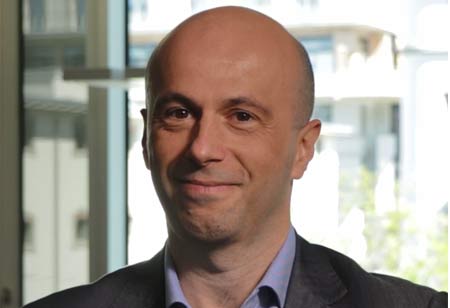Yvan Roduit, Head of Investment Advisory at Raiffeisen, possesses over 26 years of experience in the financial industry, including roles in research, sales, and advisory at various banks in Switzerland. He provides tailored investment recommendations, monitors funds and securities, and supports client engagements. Roduit's adaptability and extensive experience contribute significantly to the financial landscape, enhancing the services offered by Raiffeisen.
This article is based on an interview between Financial Services Review Europe and Yvan Roduit. He shares his insights into the successful execution of financial licensing services, future trends, and leadership strategies. He offers invaluable expertise that empowers professionals to navigate the financial industry with confidence and foresight.
Please share your experience as an investment professional and your role within your organization.
I've been in the investment industry for 26 years, primarily focusing on research until 2011. Initially focused on research from 1997 to 2011, I conducted extensive research, including credit and primary search. Transitioning to advisory roles, I worked with various banks in Switzerland, ranging from small regional banks to major players like UBS.
Since 2020, I've served as the Head of Investment Advisory at Raiffeisen CH in Switzerland. This role involves supporting bankers and clients in investment advisory matters and overseeing a team of five. We provide recommendations across funds, equities, and bonds and intervene in major client pitches as needed. Given Switzerland's linguistic diversity, proficiency in all three national languages, particularly French and German, is essential for effective communication within our team.
What are the current challenges affecting the finance industry regarding investment?
The finance industry faces pressing challenges in investment, particularly the shift towards sustainable investing. Since November 2022 at Raiffeisen CH we must recommend only 100% ESG-compliant investments, posing a significant hurdle. Understanding and effectively communicating evolving ESG and sustainable investing concepts, such as biodiversity investment, prove particularly challenging.
In Switzerland, efforts to modernize the financial sector, akin to the UK's Retail Distribution Review (RDR), encounter resistance due to entrenched traditional models. Unlike top-down approaches, cooperative banks must navigate internal persuasion to drive change, facing resistance from stakeholders unaccustomed to such shifts.
“Technology, coupled with the expectations of the younger generation, demands that we adapt our offerings to meet evolving needs.”
Overcoming resistance necessitates persuasive efforts to foster a culture embracing innovation and adaptability while educating stakeholders on modernization's benefits. This process involves altering fee structures and service models and instilling confidence in the transformative potential of these changes. Addressing these challenges requires a concerted industry-wide effort to navigate the complexities of sustainable investing while driving forward progressive reforms.
To address these challenges, are there emerging technologies or solutions that can streamline investment strategies?
Artificial intelligence, or Big Data Management, holds significant promise. We increasingly utilize technology to transmit investment ideas directly to clients and tailor recommendations to individual preferences. For example, we are implementing a new financial investment data system at Raiffeisen, a process slated for completion by 2025 or 2026. Though it's a time-intensive endeavor, working closely with the IT department allows us to refine the system and enhance efficiency in delivering investment insights to clients.
The evolving landscape, especially with the advent of big data, is intriguing. Having spent over 25 years in the industry, I can attest to the substantial paradigm shift from five years ago. Technology, coupled with the younger generation's expectations, demands that we adapt our offerings to meet evolving needs. It's essential to understand and cater to the preferences of today's investors, which differ from previous generations. Collaborating with younger colleagues brings fresh perspectives, enabling us to shape our services to better align with current demands.
Please share a specific project that you have successfully led within your organization.
One successful project I spearheaded within our organization focused on enhancing communication channels for impactful engagement with end clients and bankers. Initially, we introduced monthly investment calls but encountered mixed feedback regarding their complexity.
To address this, we diversified our approach. While maintaining the monthly calls, we introduced additional components to cater to different levels of understanding. For those seeking simplicity, we retained the existing format, while for those desiring more in-depth discussions, we introduced expert calls featuring guest speakers on specific topics.
This initiative has gained traction over the past two years, with approximately 800 to 1000 participants, including 2000 client advisors in Switzerland, regularly engaging in these sessions. The recent collaborations with esteemed asset managers such as Amundi, Pictet or BNP Paribas have enriched our discussions, exemplifying our ability to leverage partnerships for mutual benefit despite our relatively small size. This project's evolution from inception to institutionalization underscores our commitment to fostering meaningful dialogue within our community, and I take great pride in its success.
What advice would you offer to your fellow peers in the industry?
It boils down to a simple yet crucial aspect: listen to your clients attentively. Understanding their needs, desires, and aspirations is paramount. Focus on leveraging your strengths to cater to these needs effectively. Demonstrating your capabilities to the clients is essential. The client is the cornerstone of our profession. Therefore, prioritizing client satisfaction and finding innovative ways to serve them is imperative. We have various tools at our disposal, ranging from technology to personal interaction, to accomplish this. Embracing this client-centric approach is what I find most rewarding about advisory work.
It's also essential to acknowledge the significant shift towards sustainable investing. This paradigm change has profoundly impacted our processes. While it may have seemed daunting initially, embracing sustainable investing has proven to be a trend and a fundamental shift in the investment industry. Reflecting on our journey, it's clear that once considered improbable, reverting to traditional methods now seems inconceivable. This evolution underscores the nature of our field and the importance of adapting to emerging trends.












